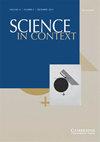Reconsidering the Role of Instrumental Technique in Creative Process: The ‘Canadian School of Double Bass’ Applied to Jazz Performance
IF 0.5
4区 哲学
Q2 Arts and Humanities
引用次数: 0
Abstract
Contemporary research exploring embodiment in music has suggested that creative musical thought is directly linked to a performer’s learnt physical techniques. Within this discourse, it is understood that an improvising musician’s embodied physical techniques play a primary role in informing their creative processes. This view suggests that subsequent changes or developments to a jazz musician’s physical technique may fundamentally influence the ways in which musical ideas are conceived while improvising. This article begins by unpacking a cross-section of literature in support of this claim, before presenting the results of a practice-led autoethnographic experiment exploring the relationship between instrumental technique and creative practice. In this experiment, I transition to a new way of playing the double bass, informed by Joel Quarrington’s The Canadian School of Double Bass, and observe transformations in hand frame, use of vertical shifts, use of register, feelings of tension and overall dexterity, all of which appear to influence my creative decision making. The results highlight how this reformed technical approach affected the physical accessibility of certain intervallic options, and appear to have fundamentally impacted my conception and construction of melodic content on a cognitive level.重新思考器乐技术在创作过程中的作用:“加拿大低音提琴学派”在爵士演奏中的应用
当代对音乐体现的研究表明,创造性的音乐思维与表演者所学的身体技巧直接相关。在这个论述中,可以理解的是,一个即兴音乐家的具体物理技术在告知他们的创作过程中起着主要作用。这一观点表明,爵士音乐家身体技术的后续变化或发展可能会从根本上影响即兴创作时音乐思想的形成方式。本文首先分析了支持这一观点的横截面文献,然后展示了一项以实践为主导的自我民族志实验的结果,该实验探索了工具技术和创造性实践之间的关系。在这个实验中,我在Joel Quarrington的the Canadian School of double bass的指导下过渡到一种新的演奏低音提琴的方式,并观察了手框的变化,垂直移动的使用,音阶的使用,紧张的感觉和整体的灵活性,所有这些似乎都影响了我的创作决策。结果突出了这种改革后的技术方法如何影响某些音程选项的物理可达性,并且似乎从根本上影响了我在认知层面上对旋律内容的概念和构建。
本文章由计算机程序翻译,如有差异,请以英文原文为准。
求助全文
约1分钟内获得全文
求助全文
来源期刊

Science in Context
综合性期刊-科学史与科学哲学
CiteScore
0.80
自引率
0.00%
发文量
1
审稿时长
>12 weeks
期刊介绍:
Science in Context is an international journal edited at The Cohn Institute for the History and Philosophy of Science and Ideas, Tel Aviv University, with the support of the Van Leer Jerusalem Institute. It is devoted to the study of the sciences from the points of view of comparative epistemology and historical sociology of scientific knowledge. The journal is committed to an interdisciplinary approach to the study of science and its cultural development - it does not segregate considerations drawn from history, philosophy and sociology. Controversies within scientific knowledge and debates about methodology are presented in their contexts.
 求助内容:
求助内容: 应助结果提醒方式:
应助结果提醒方式:


